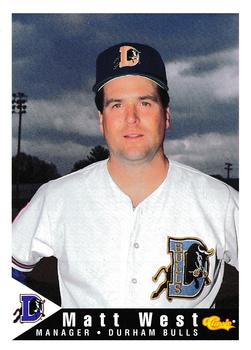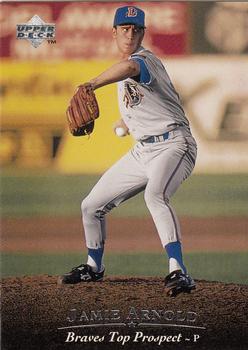Welcome to the fourth week of a look back at the "Other" 1995 seasons for teams affiliated to the Braves. In many cases, I search for information about the particular team through Google, whose their automatic fill-in options don't catch my eye. In the case of the 1995 Durham Bulls, there was something that grabbed my attention. If you have Chrome, go ahead and start typing "1995 Durham Bulls." I'll wait.
Did you see the word "brawl" follow the phrase? The 1995 Bulls are known for the brawl that occurred on May 22, 1995. I'll get to that in a little bit, but let's talk about the Bulls a little more. Popularized by the Kevin Costner flick, Bull Durham, the Bulls began an association with the Braves in 1980 and continued until 1997. At that point, the Bulls changed to a Rays squad and moved up to AAA. 1995 was also the first year for the Bulls in their new ballpark, a 7,000-seat stadium that has been expanded to 10,000 seats now.
Still, for 17 years, the city of Durham, NC saw some of the greatest Braves prospects play. The squad in 1995, however, wasn't one of those teams filled with tremendous young stars. They were led on the field by Matt West, a veteran of eight minor league seasons, including seven with the Braves. He retired after 1988 and became a coach in the Braves organization, before being promoted in 1994 to the manager of the Bulls. In two seasons with the Bulls, he led Durham to a 129-146 record before going into sales and marketing, eventually starting his own company named Intangibles, LLC.
Three players picked up significant time behind the plate, including the underwhelming Dave Toth. In 11 minor league seasons, Toth finished with a .682 OPS, including a .664 OPS with Durham in 85 games. He received cameos in 1995 and 1997 with the Richmond Braves and would play three seasons with the White Sox and their AAA squads, but never played in a major league game.
At first base, West could pencil in Randall Simon daily. On a bad offense, the native of Curacao slashed .264/.326/.440 with 18 HR and a team-leading 185 TB. Probably his oddest statistic was that of his 36 walks, 14 were intentional. That was the most by a player in the Braves minor league system and double what Andruw Jones had. Ron Wright blasted 32 homers for Macon and was walked intentionally once. Simon would go on to make it to the Braves for cup of coffee runs in 1997 and 1998 before spending most of 1999 with the Braves, hitting .317 with 5 HR in 237 PA. After the season, he became involved in a controversy when John Rocker supposedly referred to Simon as a "fat monkey" in Rocker's infamous interview to Sports Illustrated. Possibly seeking to avoid a season-long issue, the Braves cut Simon after spring training. Simon would make it back to the majors in 2001 and he produced well for a pair of bad Tigers clubs, slashing .302/.327/.454 over 211 games. Still, the Tigers traded him to the Pirates after the season. In 2003, Simon would again find himself embroiled in controversy when during a Sausage Race in Milwaukee, Simon hit one of the racing Sausages with a bat. He didn't cause the female student doing the race any serious injury beyond a skinned knee, but Simon was suspended and fined, both by MLB and the Milwaukee police. He later made nice, giving an autographed bat to the female, who also received a complimentary trip to Curacao from the overly nice Curacao Tourism Board. Simon would play for the Cubs, Rays, and Phillies over the remainder of his MLB career, but struggled. He also spent 16 games in Japan, sucking it up. After three seasons in the independent leagues, Simon hung 'em up after 2010.
A pair of light-hitting middle infielders got the majority of playing time up the middle. Manny Jimenez hit .245 in his third different year with Durham and his .602 OPS was his best total with the Bulls. He would spend two more years with Greenville before his career ended after the 1997 season. Similar case for Danny Magee. A former sixth rounder from Louisiana, Magee would repeat Durham after slashing .256/.315/.350 with the Bulls in 1995. He was actually very productive in 1996, slamming 12 HR to go with 17 steals, but was cut after just seven games with Greenville in 1997 and his career was over.
Johnny Knott was part of a group that manned the hot corner. Of the lot, he had the best season for Durham. The 5'11" right-hand hitting third basemen from St. Louis, Knott hit .267/.401/.422 with 11 HR and 11 steals. This was following up a productive 1994 season with Macon that saw Knott OPS .867 with 17 HR and 38 steals. Nevertheless, he was released before the 1996 season. With no blogs to question the decision, it went largely unnoticed and wasn't given a ridiculous amount of expert disagreement. The Braves must have knew something because Knott failed to catch on with a big league organization and spent 1996-2000 hitting 59 homers and OPSing .933 in independent baseball before finishing up his career before his 30th birthday.
In left field, Gator McBride played in his third season of professional ball and struggled to make enough solid contact. After hitting .338 in 81 games with Macon the previous season, McBride struggled to a .236 season with a .734 OPS. He would never make it to AAA and was cut after 1998. He spent that year with a month-plus in Sarasota for the Red Sox and the rest of the season with Chillicothe in the independent Frontier League. That would be his final season. Manning the other corner slot was Scott Pagano, who was picked up from the independent league Ohio Valley Redcoats after OPSing 1.025 in 1994. Pagano, who the Tigers cut after two seasons after making him a 16th round pick in 1992, would spend one year with the Braves and OPS'd .658 with the Bulls. He did steal 41 bases, second most in the Carolina League. He would get time in the Mets and Phillies organization, never making it past AA, and finished his career with a run in the Mexican League.
1993 second rounder Andre King was the everyday option in center field. King hit just .252/.327/.382, failing yet again to turn his speed into a true weapon. In late August, the Braves sent King to the White Sox for Mike Devereaux, who would go on to claim the NLCS MVP award against the Reds. King wouldn't spend long in their system and headed to the Reds organization for 1996. He gave up baseball after 1997 with a career slash line of .237/.322/.347 and just 13 games above A-ball. That fall, he walked-on at Miami and played wide receiver for the Hurricanes for four years before becoming a 7th rounder for the Browns in 2001. After four seasons and 30 receptions, King's football career, like his baseball career, was over. Also with the Durham Bulls and playing the corner outfield position was Wonder Monds. That's what baseball-reference calls him. His full name is Wonderful Terrific Monds III, a name that was originally given to his grandfather after the latter's birth followed a number of girls and was considered to be "wonderful, just terrific." A 50th rounder out of Tennessee State in 1993, Monds OPS'd .717 with 28 steals for Durham and would play with the Braves organization until 1997. After years with the Rockies and Reds organization, Monds ended his career without appearing in AAA.
Six different pitchers received at least 14 starts with the Durham Bulls. Micah Bowie was the best of the group, though the lefty still walked 61 in 130.1 ING. Though his minor league numbers were largely average, Bowie picked the right time to have his best season, posting a 2.96 ERA with Richmond in 1999. It got him both to the majors briefly in Atlanta before being packaged in a deal to the Cubs that brought over Jose Hernandez and Terry Mulholland for the stretch run. Bowie's 11 starts in Chicago were awful. Like, let's talk about this for a second awful. In 47 innings, he gave up 54 runs (all but two were earned), 8 homers, and walked 30. A 2.19 WHIP is hard to accomplish in 47 innings because rarely can you pitch that bad and pitch that often. Bowie would become a journeyman from there, playing in four different organizations and making it to the majors with three of them, though never for very long. His 30 game, 57.1 ING run with the Nationals in 2007 was the exception. After 2008, Bowie's career was finished.
John LeRoy posted a 5.44 ERA in 125.2 ING with the Bulls in 1995, but he was only 20. He would repeat the level and nearly shaved off two runs off his ERA. He spent the next season in AA, but struggled. Still, he appeared in a game against the Mets that September. The Braves had already won a hundred and opened their final series of the year at Shea Stadium. Playing the game like a spring training game where many regulars received two plate appearances and a trip to the bench, the Braves fell behind 5-1 early and by the seventh, they had fought back to a 6-4 deficit. With Tony Graffanio on first, Rafael Belliard stepped in against Brian Bohanon and for the first time in ten years, Belliard hit a homer that tied up the game. LeRoy got the call in the ninth and around a walk, he K'd the side. In the tenth, the Mets loaded the bases off LeRoy, but failed to score. An RBI single by Danny Bautista put the Braves ahead and they would win 7-6, giving LeRoy his first major league win in his first major league game. He would never pitch in the majors again. He would play until 2001, including a four-game run with the new Rays-affiliated Bulls in 1998.
Young righty Jamie Arnold was repeating Durham and posted a 3.94 ERA in 14 games before a ten game run in Greenville that was awful. Arnold would eventually get to the bigs with the Dodgers in 1999 for 36 games and pitched for both Chicago and the Dodgers in 2000. In 50 games in the major leagues, Arnold posted a 5.73 ERA. After heading back to the minors, Arnold would pitch for two more years before hanging up his spikes.
Matt Byrd led the way in the bullpen with 27 saves, which led the system. It would be his best year of a short career. After struggling in 79 games with Greenville over the next two seasons, Byrd was released and finished up his career with ten games in the Colorado system.
However, the most notable thing that occurred during the 1995 season for the Durham Bulls happened on May 22nd. Playing the Winston-Salem Warthogs, a Reds affiliate, after twice getting nailed by the Warthog pitcher following homers, Knott charged the mound and brawl that caused a 32-minute delay was ON! I found a better description than I can provide here, but former Brave Paul Bako was also involved and one player went to the hospital. Every player on both teams were suspended and fined with the exception of two pitchers, one for each team, that were in the stands charting pitches.
Overall, the Bulls finished 13 games under .500 with the third most anemic offense and second worst pitching staff. They lacked marquee prospects and were outclassed by the rest of the Carolina League. It's a bad sign when the most notable thing about a team's year is the brawl they got into, even if it was a historic one.





No comments:
Post a Comment